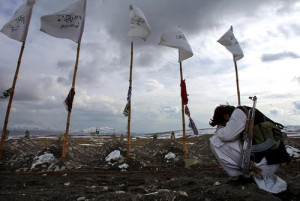I’m proud to feature today the guest post of a friend of mine and soon-to-be lawyer extraordinaire, Ms. Abigail Cheung. Abigail has a long-standing interest in immigration law, and I am sure will continue to be very active both from a legal and policy perspective for years to come. Currently, Abigail is a Summer Articled Student at one of Canada’s top law firms based out of it’s Vancouver office.
In this piece, Abigail talks about her work in U.S. Immigration Law and at an Immigration Law Clinic while she was an undergraduate student at Yale University.
Kabul does not have mailing addresses the way other cities do. So imagine my surprise when I received a response to a letter I’d sent to the address “opposite the Dutch Embassy, Kabul,” a week after mailing it from the US to Afghanistan. Even more incredible than the package’s arrival were its contents: three intifadas handwritten by members of the Taliban. I know these things because, in my third year of university, I met Marouf.
Although I had taken a course on US Immigration Law before participating in a clinic called Immigration Legal Services at Yale Law School, no amount of training could have prepared my partner or me for the man we would come to know intimately over the next four months. The first time we interviewed Marouf, Scarlet and I were nervous, but Marouf was positively skittish. It quickly became apparent that the questions we had prepared weren’t altogether appropriate. Before us was a man who told us he had been kidnapped and tortured and had left everyone and everything he knew behind because people had threatened to kill him. And here we were, wanting to know details like how long Marouf had lived in a refugee camp, and whether or not he had a graduation certificate from the school he’d attended there to prove that.
Sometimes, Marouf would get frustrated. Why were we asking prying questions about his family members’ lives? Why were we asking him to delve into memories he had tried to forget? Sometimes, we would get frustrated. Marouf told us his story one way; the next time we met, his story, or its chronology, had changed. Was it possible, we wondered, for someone to forget how many times his kidnapper had beaten him? Could one fail to remember the contents of a personalized death threat?
For months, we worked feverishly. We made timelines and checklists. We found translators who helped us maneuver between Farsi and Dari. We perused country of origin information, sought out expert testimony and outlined the basis for Marouf’s claim. Four months later, we had a comprehensive story.
Over the course of our interviews, I noticed changes in Marouf. Scarlet and I worked on building trust with Marouf until he was willing to volunteer information without prompting. Initially afraid of the dark, Marouf eventually overcame his fear and even drove to one of our interviews at night. Gradually, Marouf opened up and excitedly told us about his brothers, sister and nephew.
Marouf also changed me. When you realize that failing to complete your homework to the highest standards could result in your client’s deportation and potential death, you develop a new type of work ethic. When someone calls you on a Friday night to ask you if committing suicide might protect his family members from danger, you gain a new level of compassion. When someone explains what it’s like to have handwritten death threats posted on his family home’s door on three separate occasions, war takes on new meaning.
Marouf attended his immigration hearing in December 2010. One month later, Marouf was granted asylum.
After meeting Marouf, it was hard not to think about war and migration in human terms. The summer after I met Marouf, I met a Rwandan who ran a computer shop in South Tel Aviv. A long, framed photo of men dressed in traditional costume and their cattle hung over the store’s entrance. After he caught me looking at it, Sentwali invited me to sit down. He explained that it was his only picture of him in his hometown, which had since been razed to the ground. Two years ago, I met an Eritrean woman in Hong Kong. During one of our interviews, she rolled up her sleeves to show me scars she had had gotten from having been tied to a tree and left under the baking sun for hours—punishment for being a Copt in a country that didn’t recognize the religious sect.
Several years after first meeting Marouf, I am no longer satisfied with listening to immigrants’ stories; I’m determined to change them. A few months ago, I attended a rally in downtown Toronto where participants spoke out against the governments changes to live-in caregivers’ pathway to permanent residency. My hope is that by speaking up, we can make sure immigrants’ stories are not just stories on a page.

